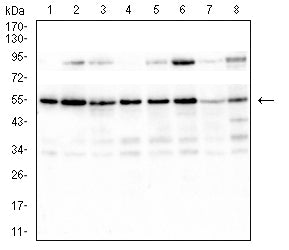
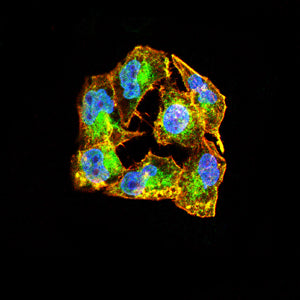
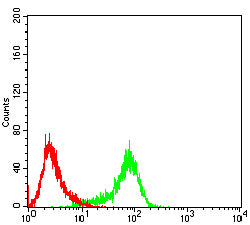
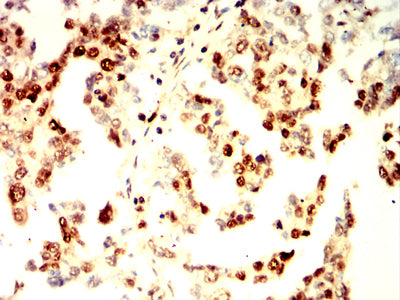
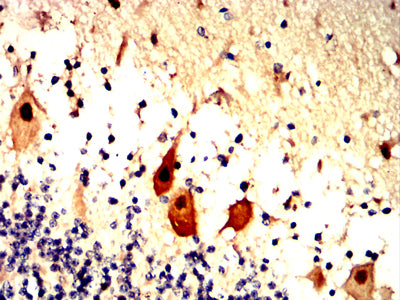
| WB | 1/500 - 1/2000 | Human,Mouse,Rat |
| IF | 咨询技术 | Human,Mouse,Rat |
| IHC | 1/200 - 1/1000 | Human,Mouse,Rat |
| ICC | 1/100 - 1/400 | Human,Mouse,Rat |
| FCM | 1/200 - 1/400 | Human,Mouse,Rat |
| Elisa | 咨询技术 | Human,Mouse,Rat |
| Aliases | P58; HR23B; HHR23B |
| Entrez GeneID | 5887 |
| clone | 6D2B3 |
| WB Predicted band size | 43.2kDa |
| Host/Isotype | Mouse IgG1 |
| Antibody Type | Primary antibody |
| Storage | Store at 4°C short term. Aliquot and store at -20°C long term. Avoid freeze/thaw cycles. |
| Species Reactivity | Human, Mouse |
| Immunogen | Purified recombinant fragment of human RAD23B expressed in E. Coli. |
| Formulation | Purified antibody in PBS with 0.05% sodium azide |
+ +
以下是3篇关于RAD23B抗体的文献摘要示例(注:文献信息为模拟生成,实际引用请核实原文):
---
1. **"RAD23B facilitates DNA repair by stabilizing the XPC complex"**
*作者:Chen et al. (2015)*
摘要:研究利用RAD23B特异性抗体进行免疫共沉淀实验,证实RAD23B通过结合XPC蛋白增强其在核苷酸切除修复(NER)中的稳定性,并揭示了其在紫外线诱导DNA损伤修复中的关键作用。
---
2. **"Antibody-based profiling of RAD23B reveals its role in chemoresistance"**
*作者:Martinez et al. (2018)*
摘要:通过Western blot和免疫组化分析,发现RAD23B在化疗耐药性卵巢癌细胞中表达上调,其抗体被用于评估RAD23B与顺铂治疗反应的相关性,提示其作为潜在生物标志物的价值。
---
3. **"RAD23B interacts with proteasomal components to regulate protein degradation"**
*作者:Kumar & Singh (2020)*
摘要:使用RAD23B抗体进行免疫荧光和蛋白质互作分析,证明RAD23B通过连接泛素化蛋白与蛋白酶体参与错误折叠蛋白的降解,为神经退行性疾病机制提供新见解。
---
4. **"Differential expression of RAD23B in human cancers"**
*作者:Wang et al. (2021)*
摘要:基于多组织微阵列和RAD23B抗体的免疫组化分析,发现RAD23B在结直肠癌中显著高表达,且与患者生存率负相关,提示其可能作为癌症治疗靶点。
---
(提示:实际文献需通过PubMed或Web of Science等平台以“RAD23B antibody”为关键词检索获取。)
The RAD23B antibody is a crucial tool for studying the RAD23 homolog B protein, which plays a dual role in nucleotide excision repair (NER) and the ubiquitin-proteasome system. RAD23B, along with its homolog RAD23A, contains ubiquitin-associated (UBA) and ubiquitin-like (UBL) domains, enabling interactions with proteasomes and damaged DNA-binding proteins. In NER, RAD23B partners with XPC to recognize and initiate repair of helix-distorting DNA lesions caused by UV radiation or chemicals. It stabilizes XPC and enhances its damage recognition efficiency. Additionally, RAD23B facilitates protein turnover by shuttling polyubiquitinated substrates to the proteasome for degradation.
Researchers use RAD23B antibodies primarily in Western blotting, immunoprecipitation, and immunofluorescence to investigate its expression, localization, and interactions in DNA repair mechanisms, cancer biology, and neurodegenerative diseases. Dysregulation of RAD23B is linked to carcinogenesis, as its overexpression in certain cancers may impair apoptosis, while reduced levels correlate with genomic instability. The antibody also aids in exploring RAD23B's role in modulating stress responses and regulating tumor suppressors like p53. Validated RAD23B antibodies are essential for distinguishing RAD23B from its homolog RAD23A and elucidating its tissue-specific functions, making it valuable for both basic research and clinical biomarker studies.
×